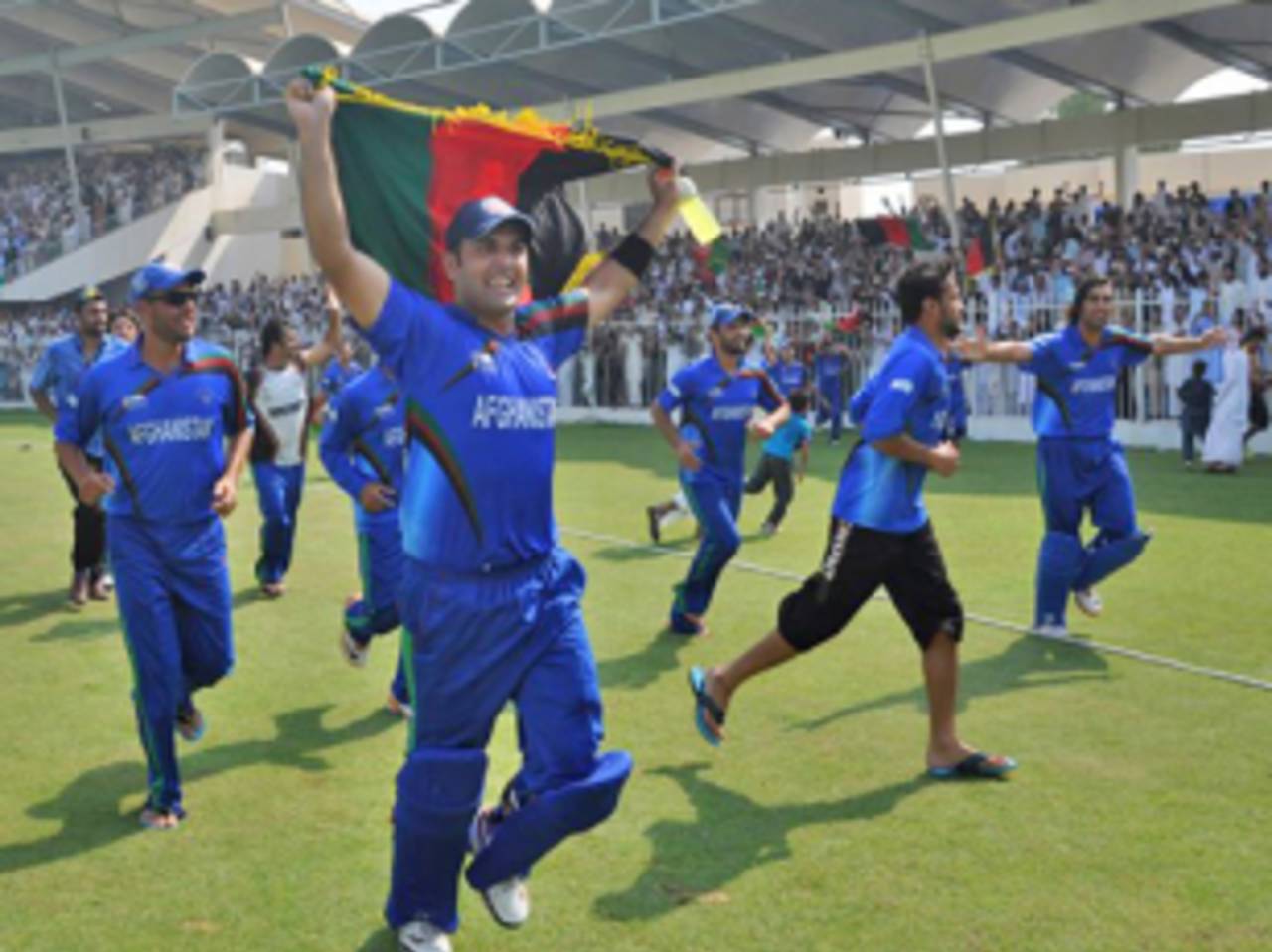Afghanistan can cause upsets - Akram Khan
Akram Khan, the former Bangladesh captain, has said that Afghanistan's achievement at qualifying for the 2015 World Cup is akin to when his side won the 1997 ICC Trophy to seal a 1999 World Cup berth
Mohammad Isam
07-Oct-2013

The reactions from the Afghanistan players reminded Akram Khan of Bangladesh's triumph at the 1997 ICC Trophy • ICC/Saleem Sanghati
Celebrations in Kabul after Afghanistan's first-ever qualification to the 2015 World Cup evoked memories of the scenes in Dhaka and the rest of Bangladesh when they won the ICC Trophy in 1997 to qualify for the 1999 World Cup.
It's a doorway to international exposure and more, but there are several pitfalls to be avoided, said Akram Khan, who led Bangladesh in the 1997 ICC Trophy triumph, and played a pivotal role in its transition to the biggest stage.
"One achievement can create a lot of goals," Akram told ESPNcricinfo. "After we qualified for the 1999 World Cup, I said that my dream was to beat Pakistan. And we did it. Having seen some of the Afghanistan players in Dhaka this year, I am sure they will upset a few teams. They deserve qualification to the 2015 World Cup."
"The world will see you play. It will open doors for you, particularly these days when a lot of domestic competitions are looking for performers."
Akram said that the Bangladesh players were slowly getting prepared for the stage they reached in 1997 and 1999 through years of near-misses at the ICC Trophy, and a strong club cricket structure at home. Domestic cricket should be a priority for Afghanistan, he added, and the passion of the general public will be an added advantage.
"If Afghanistan has a domestic structure going, if they get the facilities and the security, you will see their improvement. Seeing their passion after their qualification was confirmed, I think they have something big waiting for them in cricket. They have a physical advantage to some of the other teams at their level.
Akram also warned against complacency, particularly in terms of maintaining a regular flow of players.
"UAE had the chance to make it big in international cricket when we were also an Associate side, but they didn't utilize the opportunity. Bangladesh did it quite well but there is a lot left to do in terms of playing standards.
"When Kenya had their best side, most of them came from one or two families. It is important to hold on to a steady side. We had Mashrafe, then came Ashraful, Shakib, Tamim, Mushfiqur. Kenya and UAE didn't have this flow of players."
Another factor that the Afghan players must be wary about is a drop in form. They are going to carry around the tag of "minnows" for as long as cricket fans and the media want, and when minnows do badly, calls for their head become inevitable. Just ask Bangladesh.
Both teams are coincidentally in the same group during the 2015 World Cup. They have played twice against each other, both in Twenty20 matches, with Bangladesh winning on both occasions, but the likes of Mohammad Nabi, Mohammad Shahzad, Shapoor Zadran, Hamid Hassan and Gulbadin Naib, who have all played in the Bangladesh Premier League and the 50-over Dhaka Premier League, have given a glimpse of what to expect in the forthcoming tournaments.
The Afghanistan Cricket Board has expressed unease about their relationship with the BCB. There is mutual admiration, and help has already begun in the form of recruiting Afghanistan players, and their growing popularity in the country.
It could all stoke a fine rivalry, and the context is already being set. Bangladesh's biggest rival has so far been Zimbabwe, so a new rival closer to home could make things more interesting.
Mohammad Isam is ESPNcricinfo's Bangladesh correspondent. He tweets here